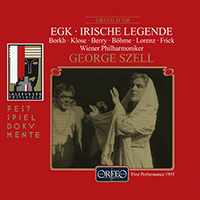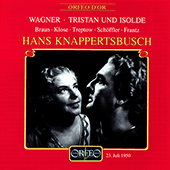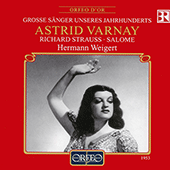Margarete Klose
Margarete Klose’s father died when she was young, meaning that although always a keen singer, she had to support herself by working as a secretary. However, her talent was recognised by a colleague who advised her to audition for the Klindworth-Scharwenka Conservatory in Berlin, where she was immediately accepted for vocal studies with Franz Marschalk and Walter Bültemann, whom she married. She made her operatic stage debut in 1927 as the gypsy girl Manja in Kalman’s operetta Gräfin Maritza, followed by Azucena / Il trovatore in Ulm where she sang a wide variety of roles and stints with the opera companies at Kassel and Mannheim.
By now Klose was tackling all the major mezzo-soprano roles. She was engaged by the Berlin State Opera in 1931, remaining with this company until 1949. She made her debut as Azucena, followed by Klytaemnestra / Elektra under Furtwängler, Ortrud / Lohengrin under Erich Kleiber and Adriano / Rienzi under Leo Blech, as well as many other roles. Among the first performances in which she participated in Berlin were Pfitzner’s Das Herz (1931), Herbert Windt’s Andromache (1932) and Paul Graener’s Der Prinz von Homburg (1935).
When Klose sang in the Paris Wagner Festival conducted by Hoesslin in 1930, and as Waltraute / Götterdämmerung at The Hague, she attracted international attention. She first sang at the Royal Opera House, London in 1935, as Ortrud under Beecham, followed by Fricka / Der Ring des Nibelungen, Waltraute and Brangäne / Tristan und Isolde in 1937.
Klose was now recognised as the leading German mezzo-soprano. She had made her Zoppot Festival debut as Adriano in 1935 and her Bayreuth Festival debut in 1936, singing major Wagnerian mezzo parts there until 1942; and enjoyed a sensational success as Ortrud at the Vienna State Opera in 1938, followed by similar acclaim in Rome the next year. During World War II she remained a prominent member of the Berlin State Opera ensemble and participated in many radio broadcasts. After the war she sang with Berlin’s Städtische Oper from 1949 to 1955 before returning to the Berlin State Opera until 1961, when she retired.
At the Salzburg Festival in 1949 Klose took part in a landmark performance of the Verdi Requiem conducted by Karajan; sang Fricka under Furtwängler at La Scala, Milan in 1950 (having first sung there in 1939) and the Kostelnička / Jenůfa at the Teatro Colón, Buenos Aires in 1951. She gave her only American performances with the San Francisco Opera in 1953, when she sang Brangäne, Fricka, Klytaemnestra and Ulrica / Un ballo in maschera; and continued to be active as a guest at Dresden, Hamburg, Munich and elsewhere with a repertoire extending to Carmen, Herodias / Salome, Amneris / Aida, Eboli / Don Carlo, Dalila / Samson et Dalila and Albert’s mother / Albert Herring. Following her retirement in 1961 she gave annual summer master-classes at Salzburg before her unexpected death from a heart attack.
Klose’s rich but unusual voice, combined with her superb sense of musical style and dignified dramatic bearing, made her one of the outstanding singers of her generation. Her singing possessed a great sense of pathos, which made her also an especially successful concert and lieder singer.
© Naxos Rights International Ltd. — David Patmore (A–Z of Singers, Naxos 8.558097-100).



















